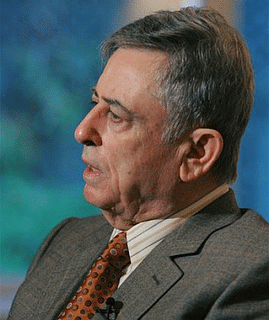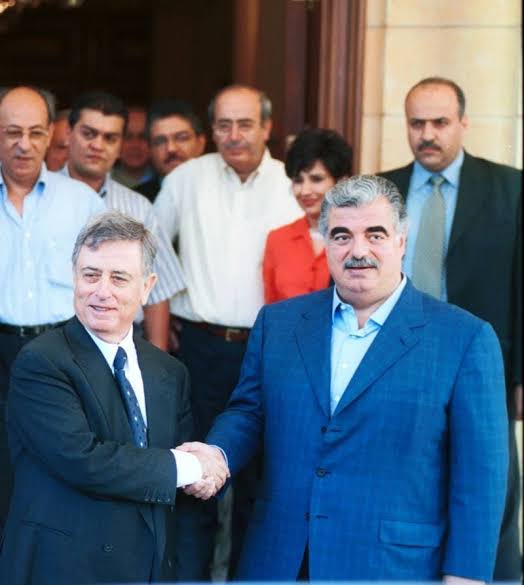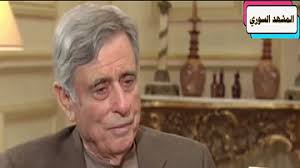Former Syrian vice president Abdel Halim Khaddam, who broke away from the ruling Baath Party and now lives in exile in Paris, said he was seeking to establish a national alliance for ousting President Bashar Assad.
“I am working on a national alliance in Syria … to topple Bashar Assad and hold the security officials around him accountable for implicating him in negative dealing with Syrian citizens,” Khaddam said in an interview with United Press International in Paris over the weekend. He stressed that he has no personal ambitions and has “nothing to hide or fear”.
Khaddam denied having any links with former Syrian officials living abroad, including former army chief of staff Hikmat Shehabi and Rifaat Assad, the brother of late president Hafez Assad who has been exiled for more than a decade after reportedly attempting to topple his brother.
Asked about the political system which he seeks to install in Syria, Khaddam, who resigned from the Baath Party last June, said, “in the 1950s Syria was a democratic country and had stopped the Baghdad Alliance (a 1958 US-led alliance to stop then Soviet infiltration in the region). Democratic Syria at that time used to send qualified cadres to most Arab countries.”
Nowadays and after freedom has been restricted in Syria, he argued that “if the government wants to appoint a governor for the central bank, it cannot find qualified cadres, and settles instead on accountants who worked in restaurants.”
“The aspired regime in Syria should be democratic, meaning releasing all public freedoms and abolishing the emergency laws and this would unleash the potentials of the Syrian people so that they realign themselves and regain their role on the Arab scene,” Khaddam said.
He expressed support of the so-called “Damascus Declaration” which was adopted on October 16 by 12 opposition parties in addition to independent politicians and called for “drastic and democratic change in Syria”.
The Damascus Declaration underlined that “setting up a national democratic system is the main entry to political change and reforms” which Assad had promised to introduce after taking power in July 2000, a month after his father died.
Khaddam stressed that “the Damascus Declaration largely expressed the aspirations of the Syrian people and I support this declaration whose content is in full conformity with my point of view.”
He refused to say if he was in contact with the parties and politicians who signed the Damascus Declaration, emphasizing the need to introduce “a new law for political parties in Syria which places no restrictions on any group seeking to establish a political party.”
Khaddam hailed French President Jacques Chirac’s policies towards Lebanon and Syria as “correct”, blaming Assad for the deterioration in relations between Damascus and Paris.
He denied making any contacts with US officials and refused to give details about the testimony he gave last week to the UN-commissioned probe into the February 14 assassination of former Lebanese prime minister Rafiq Hariri who was killed in a massive Beirut blast.
The former Syrian official accused Assad of treating Hariri in a harsh way, causing his nose to bleed from stress after one of their meetings in Damascus, and of incitement against the Lebanese premier which led to his assassination.
On the possibility of easing tension in Lebanese-Syrian relations that sharply deteriorated after Hariri’s killing, Khaddam said it would be hard to convince a group of Lebanese who held Syria responsible of the assassination to normalize relations before the UN investigation is concluded.
Syria has repeatedly denied involvement in the crime, but international investigators named Syrian security officials as suspects.
Khaddam, who was in charge of the Lebanese file during the 1975-1990 civil strife and until Hafez Assad’s death in 2000, warned against undermining or meddling with the Taif peace accord which had silenced the guns of the Lebanese war and reconciled the warring factions, saying this will take Lebanon back to point zero, notably to a new civil strife.
The Taif accord, which was concluded in November 1989 and brokered by Saudi Arabia, redistributed powers equally between Lebanese Muslims and Christians.
On his official status in France where he has been living for at least six months, Khaddam said he did not contact any French official and did not ask for political asylum.
“There is no protocol forbidding any foreign politician from speaking out in France where there is freedom of expression,” he said.
Some French diplomats have expressed embarrassment over Khaddam’s remarks on the Syrian regime and his accusation of Syrian officials of corruption and incitements against Hariri.
A French foreign ministry spokesman was quoted as saying that France has no contacts with Khaddam and no relation with what he is saying about the Syrian regime.
Khaddam affirmed that Chirac was not related in any way to his new approach.
“Effectively he [Chirac] is not linked whatsoever to what I am saying…. He is not using what I say to oust the Syrian regime and never said he is seeking to topple that regime,” Khaddam told UPI.
He charged that the reasons behind the deterioration in French-Syrian relations are “Bashar Assad’s wrong political readings and decisions”.
“The Syrian people wanted the Syrian army to withdraw from Lebanon since 2000 after Israeli forces pulled out from south Lebanon,” he said.
Syria pulled out its troops from Lebanon in April last year, two months after Hariri’s assassination, under local and international pressures, notably UN Security Council Resolution 1595 which called on Damascus to remove its troops immediately.
“France is a friend for Syria, Lebanon and the Arabs and should be treated on this basis,” Khaddam said.



